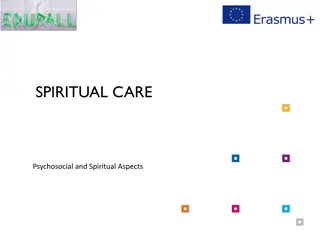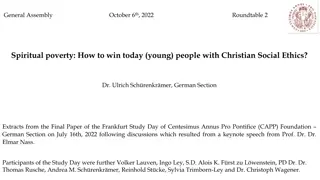Understanding Spiritual Receptivity in Today's Society
Explore the concept of spiritual receptivity in a society dominated by relativism and pluralism. Discover how Christians can effectively engage with individuals of different beliefs, advocating their faith and values to bring about life-changing results.
Download Presentation

Please find below an Image/Link to download the presentation.
The content on the website is provided AS IS for your information and personal use only. It may not be sold, licensed, or shared on other websites without obtaining consent from the author. Download presentation by click this link. If you encounter any issues during the download, it is possible that the publisher has removed the file from their server.
E N D
Presentation Transcript
Discerning Spiritual Receptivity Church Renewal Resource Evangelism Ministries USA/Canada Region Church of the Nazarene
Discerning Spiritual Receptivity Purpose: Encourage Christians to witness openly and winsomely. Objectives: Discover ways to interact with people outside the Christian faith; Discern how receptive people are to the Gospel; Inspire people to re-envision God for our culture.
Discerning Spiritual Receptivity The prevailing THOUGHT patterns in American society are relativism and pluralism. Relativism means there is no objective truth, i.e. everyone can BELIEVE as they want to.
Discerning Spiritual Receptivity With relativism the primary authority is one s own personal opinion. Common expressions of relativism include: It all depends upon the individual. Whatever is right for you. . . No one can tell you what is best for you.
Discerning Spiritual Receptivity Pluralism believes TRUTH can be seen in a variety of ways. Dogmatic pluralism ACCEPTS diversity as absolute truth. Descriptive pluralism recognizes and VALUES uniqueness, while acknowledging God does work differently in people s lives.
Discerning Spiritual Receptivity The church has not effectively COUNTERED relativism and pluralism. While we can ARGUE logically against relativism and dogmatic pluralism, they pose problems for the Christian. Relativists are ACCEPTING of everyone s point of view. Dogmatic pluralists are INSULTED that we would even attempt to suggest they or anybody need a better life. Human experience shows that ENGAGING people in philosophical discussions brings little, if any, satisfactory results.
Discerning Spiritual Receptivity So how do we speak to our world in a way that brings life-changing results? Christians may become effective by taking an ADVOCACY approach to our culture.
Discerning Spiritual Receptivity Advocacy means that we aggressively PROPOSE our faith. Christians are to put their values and beliefs into the MARKETPLACE of ideas alongside all others. The advocacy approach then RELIES upon the Holy Spirit to drive home the truth in the hearts of people.
Discerning Spiritual Receptivity When Jesus came to earth, He RE- ENVISIONED God for people. People had never seen God as Jesus DESCRIBED Him. Jesus EXPLAINED that God was good and loving. God wanted to ANSWER prayer. He wanted to FORGIVE sins.
Discerning Spiritual Receptivity Jesus said He was a REFLECTION of the Father. Jesus LIVED out what He said God was like. He TAUGHT His followers to be like Him. Jesus told His disciples they were to COMPLETE what His Father had sent Him to do.
Discerning Spiritual Receptivity The disciples COMMUNICATED with the world what they had seen, heard and experienced (1 John 1:1-4). The work of re-envisioning God is simply REPORTING what one has seen, heard, and experienced.
Discerning Spiritual Receptivity People are most CONVINCED by a process of evangelism. The process includes: ESTABLISHING credibility as a consistent, godly person. Making CONTACT with the world at the point of their interest and need.
Discerning Spiritual Receptivity ENGAGING in acts of compassion that convince the unbeliever of your concern. Communicating the gospel in words that EXPLAIN the grace of God and the centrality of Christ. Counseling people to SEEK the Lord with their whole heart. Challenging people to enter into a LOVING relationship with Christ.
Discerning Spiritual Receptivity Effective evangelism requires those witnessing to EVALUATE the openness of people to the Gospel. God FREES us to seek responsive people. When people do not accept us, He recommends we go on. He tells us not to cast our pearls before swine (Matthew 7:6). In other words, there are times when we should not share the Gospel.
Discerning Spiritual Receptivity How do we know when a person is ready to ACCEPT Christ? They first ACCEPT you as a person. They are willing to enter into SPIRITUAL conversation. They are willing to LISTEN to the gospel. They EXPRESS an on-going interest in the things of God. They understand that the gospel REQUIRES a change on their part.
Discerning Spiritual Receptivity CONVERSATIONS OF THE PRE-CHRISTIAN EVANGELISM METHODS OF EVANGELISM PROCESS OF Presence Evangelism Sure, I believe in God. I don t know the Bible. I didn t grow up in church. I ve wondered about God and the Bible. I know I ought to learn more about God. Can you answer a question for me? Proclamation Evangelism I know God loves me. The Bible says I need to accept Christ. If I get saved, I know I will need to make some changes. Persuasion Evangelism I try to live the life. I model Christian living. I do nice things for unsaved people. Credibility of the Christian is being established. Contact with the world. Compassion or acts of kindness are shared. I explain what Jesus means to me. I tell about the time Christ came into my life. I recount how Jesus died for everyone. Communication of the Good News. Counseling people about Spiritual matters. I ask if he is ready to accept Christ. I tell her I hope she will become a Christian soon. I know I should get saved. I need to get right with God. I think I m ready to accept Christ. Will you pray with me? Challenging people to respond to God s offer of relationship.
Discerning Spiritual Receptivity Christians continue to build their relationships with the pre-Christian, modeling Christ s love. Christian witnesses show genuine concern for prospective believers and seek ways to meet their needs. Presence Evangelism Proclamation Evangelism Christians share what they have seen, heard, and experienced of God. Often conversations simply turn from surface to spiritual matters. During proclamation the Christian is always listening and praying for an opportunity to share how God has or is working. Persuasion Evangelism Christians encourage pre-Christians to accept Christ. Christians also explain how to accept Christ and invite them into a relationship with God.
Discerning Spiritual Receptivity Small Group Exercise 1. Has God answered prayer? When? 2. Has God guided you in some important matter? When? How? 3. Has God blessed you with a new sense of peace, security, and freedom since you became a Christian? Write about it. 4. Has God helped you handle a difficult personal relationship? Describe the situation and how God helped.
Discerning Spiritual Receptivity Pre-Christian Methods of Evangelism Conversations of the The Process of Evangelism Actions (What I will say or do.) Presence Sure, I believe in God. Make CONTACT. Establish CREDIBILITY. Show COMPASSION. I don't know the Bible. I didn't grow up in church. I've wondered about God and the Bible. I know I ought to learn more about God. Can you answer a question for me? I know God loves me. Proclamation COMMUNICATE the grace of God. COUNSEL people about spiritual matters. The Bible says I need to accept Christ. If I get saved, I know I will need to make some changes. I know I should get saved. Persuasion CHALLENGE others to enter into a loving relationship with Christ. I need to get right with God. I think I'm ready to accept Christ. Will you pray with me?

















































